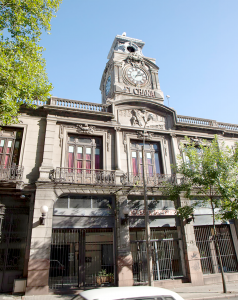
Since 2000, students have lived at Casa ACU while studying abroad. Casa ACU will close and the program will now move to a host family format for future groups.
After 15 years of students filling the halls every fall, spring and summer, the Study Abroad office is closing its doors to Casa ACU in Uruguay.
Instead of placing the Latin American program’s students in the dorm-like housing at 2073 Colonia, Montevideo, the office will launch a homestay program. For the program, students will live with host families in the city presumably apart from all other classmates.
The facility, originally used as a roastery for a leading Urugayan coffee and tea brand, but was bought by a church in the 1990s. After it was renovated to feature villa-like living areas, the university was able to sign a lease and begin the Casa ACU legacy in 2000.
Stephen Shewmaker, executive director for the Center for International Education, said the El Chana congregation, which owns the building, informed ACU of its interest in selling the facility prior to the end of their lease agreement.
Shewmaker said the new approach to living situations should advance the office’s main goal for the program.
“One of the principle reasons for that program’s existence is Spanish language acquisition, and that kind of structure is more conducive to that.”
The homestay program will also give the office time to evaluate the best move in housing options for the long-term study abroad program in Latin America, whether that entails finding a similar building to Casa ACU or continuing homestays.
Paul Roggendorff, assistant professor and director of world languages in the department of language and literature, will function as the program coordinator and point person throughout the design of the program.
“Paul has experience in working with a homestay program in Spain, and so he is the most capable and the best experienced person for us to be able to do that,” Shewmaker said.
In the past 15 years, students would fly to Montevideo with a faculty member who would live with them in Casa ACU, in addition to having the resident directors in the house.
With the closure of Casa ACU, resident directors will no longer be necessary, and faculty members could potentially be living in a separate housing structure from the students.
However, Shewmaker said a faculty member will always be in the city with students.
He said the university is looking around the Pocitos neighborhood in Montevideo, close to the Rio de la Plata in the southern portion of the city, for homestay hosts.
“Safety is a consideration, and with a program location in Central and South America, safety and risk management is important, but we also have extensive experience in the city and a lot of people on our campus that are familiar with Montevideo,” he said. “We still see great opportunities there for our students to learn, connect and grow in ways that we would want a program to accomplish.”
Beatriz Walker, associate professor in the Department of Language and Literature and native Uruguayan, is leading the last program in Casa ACU.
“To me it’s touching that after 15 years in Casa ACU, the professor that closes the program there is a native Uruguayan. It just happens to be a coincidence that I’ll be the professor with them at the last program at ACU,” she said.
Walker said when the language and literature department was still known as the foreign language department, staff and faculty recommended a homestay living to the Study Abroad office.
“With homestays, the culture will be enhanced. There’s not going to be any time spent with students among themselves talking about peanut butter and the things they miss,” she said. “They’re going to be with families soaking up the culture.”
